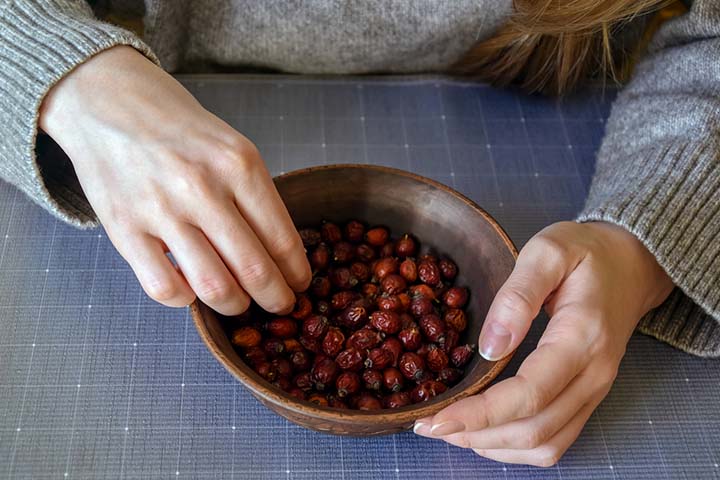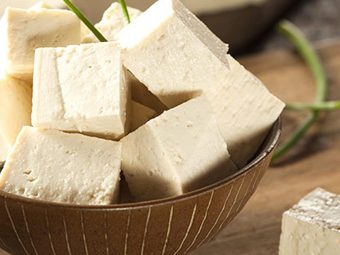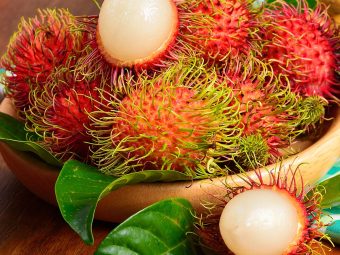
Image: ShutterStock
Pregnancy brings significant changes to a woman’s body. And when considering the well-being of the growing fetus, some things are considered safe, while others are not. For example, the safety of the consumption of rose hip during pregnancy is not yet determined.
Some people complain about experiencing certain side effects, such as headache or nausea, after consuming it. Therefore, you should take a doctor’s advice before using rose hip during pregnancy.
Read this post to understand more about the side effects of rose hip, times when you should avoid it, and ways to use rose hip oil during pregnancy.
What Is Rose Hip?
Rose hip is the fruit that appears on the rose plant. It is usually red or orange, but it can also, sometimes, be dark or purple. Rose hip is also known as rose hep or rose haw. It is categorized as a wild fruit and is endemic to parts of Africa, Asia, and Europe.
Taking its nutrition profile into consideration, rose hip is rich in vitamins, minerals, and antioxidants.
Is It Safe To Have Rose Hips During Pregnancy?
Image: IStock
There are no research studies that have been able to determine the effects of the rose hip on pregnant women’s health. As a result, several medical practitioners advise against using rosehip during pregnancy to prevent its potential adverse effects on fetal and maternal health and well-being (1).
Note: Rosehip extract or powder may be present in some dietary supplements. So read the product label carefully and use any dietary or nutritional supplement only after taking your healthcare professional’s approval.
Side Effects Of Having Rose Hip During Pregnancy
Image: Shutterstock
Whether or not you are pregnant, you can experience side effects of rose hip. In severe cases, it could also require immediate medical attention. Here are some of the more commonly known side effects of taking rose hip:
- Pain in the stomach
- Diarrhea
- Headache
- Nausea and vomiting
- Difficulty in falling and staying asleep
- Fatigue and excessive feeling of tiredness
- Heartburn and acidity
Why Should You Avoid Taking Rose Hip?
Image: Shutterstock
If you have any of the following conditions, you should not take rose hip unless your doctor has advised so:
- If you are suffering from sickle cell disease. The vitamin C in rose hip can turn the blood more acidic and worsen the situation.
- In case you have glucose 6 phosphate dehydrogenase deficiencyiXA genetic condition causing the breakdown of red blood cells leading to anemia. , the vitamin content in rose hip can increase your chances of a complication.
- If you are suffering from hemochromatosisiXA genetic disorder characterized by excess iron absorption in the body.
- If you are suffering from thalassemiaiXAn inherited blood disorder that impacts the production of hemoglobin in the body, leading to anemia and other health issues.
- If you have been diagnosed with sideroblastic anemiaiXA type of anemia caused when iron in the body is not effectively utilized in the production of red blood cells.
- If you are suffering from kidney stones, the vitamin C content in rose hip can further increase your risk of having kidney stones.
- In case you take the Coumadin (warfarin) medicine, make sure you do not take rose hip through the duration of the medicine’s course. As rose hip contains a large amount of vitamin C, it can interfere with the medication and cause an adverse reaction.
How To Make Rose Hip Tea At Home?
Image: Shutterstock
Make sure that you first speak to your doctor and only then go on to have rose hip tea, depending on your doctor’s go-ahead. Once your doctor has specifically told you that you can have it while you are pregnant, you can try the following recipe to make rose hip tea at home:
Method 1
You Will Need:
- 4 tbsp. of whole dried rose hips
- 4 cups of water
How To:
- Place the ingredients in a pan and cover it. Let it boil.
- Once the water begins to boil, put it on simmer for about five minutes.
- Strain and have the tea.
Method 2
You Will Need:
- Fresh or crushed dried rose hips
- Water
How To:
- Warm a teapot and place the rose hips inside.
- Boil the water and pour the boiled water over the rose hip.
- Cover the pan with a lid and let it steep for about ten minutes.
- Strain and have the tea.
Using Rose Hip Oil During Pregnancy
Image: IStock
While there are no studies to show the effects of rose hip when you ingest it during pregnancy, it is considered not harmful as an oil during these months. Here are a few ways in which rose hip oil can prove useful while you are pregnant:
1. Fights hyperpigmentation and reduces dark spots
Pregnancy often leads to patches of dark skin and hyperpigmentation marks on your skin which refuse to lighten or fade while you are pregnant. Anecdotal evidence suggests that applying rosehip oil is one of the effective home remedies that can help reduce the dark spots and lighten the patches of skin that have been affected by hyperpigmentation.
 Quick fact
Quick fact2. Reduces stretch marks
When you become pregnant and as you move through your months of pregnancy, you may notice the appearance of stretch marks on your skin. While there are many cosmetic brands that claim to reduce and remove the appearance of stretch marks that are caused due to pregnancy, using rose hip oil is also said to work to the same extent.
3. Soothes dry skin and itching woes
During your pregnancy, your skin will start stretching to accommodate your growing baby in your womb. As a result, it can often lead to excessive dryness in the skin, and if you are prone to dry skin, you will experience it even more. When your skin becomes dry, it can also lead to itching and irritation on the skin. Applying rose hip oil on the affected area can help to reduce your dryness symptoms and will also help with the itching sensation.
4. Presence of essential fatty acids
Rose hip oil contains a high amount of essential fatty acids that will help to ease your skin during your pregnancy months and will also help it to heal faster and better. Rose hip oil contains many essential fatty acids, the most common ones linoleic acid (omega-6 fatty acid) and linolenic acid (omega-3 fatty acid). Both these fatty acids help to speed up the process of skin regeneration and as a result, speed up the healing process of the skin as well. They also play a vital role in strengthening the immune system.
 Quick fact
Quick factFrequently Asked Questions
1. Can rosehip cause blood clots?
Rose hips are generally considered safe when taken at recommended doses, but there is a risk of developing blood clots when used in large amounts (1). Hence, rose hip should be used only after careful contemplation of its effects on prenatal health.
2. Is rosehip and hibiscus tea safe when pregnant?
It is generally not advisable for pregnant or breastfeeding women to consume rosehip tea due to a lack of studies on its safety and efficacy in these groups (2). In addition, it is also recommended that pregnant women avoid consuming hibiscus tea due to the possibility of aluminum toxicity (3).
3. Does rosehip have any effects on hormonal balance during pregnancy?
Rosehip is rich in vitamin C, which can increase the estrogen absorbed by the body. It can lead to adverse side effects and increase the risk of health problems for the mother and the child. According to studies done by the American Chemical Society, it was found that abnormally high maternal estrogen levels could lead to low birth weight in infants, premature delivery, thyroid dysfunction, autism, and cardiovascular and endocrine disorders. Therefore, please consult your doctor before incorporating rosehip into your diet while you are pregnant (4) (5).
Because there is so little information and research on the safety of rosehip consumption during pregnancy, it is best to consult your doctor before including it in your prenatal diet. Although the side effects may be mild in pregnant women, they may be more severe if you have sickle cell anemiaiXA genetic disorder that distorts the shape of red blood cells, which impacts the oxygen transport in the body. , thalassemia, or kidney stones. To avoid fetal or pregnancy issues, you should see your OB/GYN before eating any foods that appear unfamiliar or are not usually consumed during pregnancy.
Infographic: Advantages Of Rosehip Fruit, Extract, And Oil During Pregnancy
Rose hips are seed pods of the rose plant with a sweet smell and tart aftertaste, known for their medicinal properties. Do you want to know about its safety during pregnancy? The following infographic aims to educate you on its health benefits for pregnant women.

Illustration: Momjunction Design Team
Key Pointers
- Rose hip is the fruit of the rose plant, which comes in red, orange, or purple colors.
- It is a rich source of vitamins, minerals, and antioxidants.
- Consult with your doctor before using rose hip and its products. Most doctors recommend avoiding it during pregnancy due to the lack of safety studies.
- Consuming rosehip can cause side effects like abdominal pain, diarrhea, nausea, vomiting, and heartburn.
- If you have sickle cell anemia or thalassemia, avoid taking rose hip.
- Rose hip oil can help reduce hyperpigmentation spots and stretch marks.

Image: Dall·E/MomJunction Design Team
References
- rose hips; Health Information Library PeaceHealth
https://www.medicoverhospitals.in/articles/rose-hip-tea - Herbal Tea and Pregnancy; American Pregnancy Association
https://americanpregnancy.org/healthy-pregnancy/is-it-safe/herbal-tea/ - Food as Medicine: Hibiscus; American Botanical Council
https://www.herbalgram.org/resources/herbalegram/volumes/volume-17/number-8-august-2020/food-as-medicine-hibiscus/food-as-medicine-hibiscus/ - Rose Hip; Medline Plus
https://medlineplus.gov/druginfo/natural/839.html - Xinyuan Cao et al.; (2022); Effect of a High Estrogen Level in Early Pregnancy on the Development and Behavior of Marmoset Offspring; American Chemical Society
https://pubs.acs.org/doi/10.1021/acsomega.2c03263
























